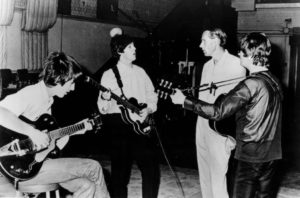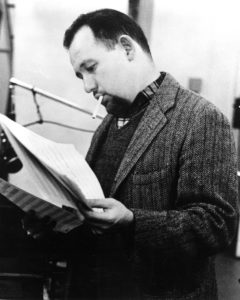The Job of a Record Producer
Here’s how The Recording Academy (formally the National Academy of Recording Arts and Sciences, or NARAS) defines a record producer:
“The person who has overall creative and technical control of the entire recording project, and the individual recording sessions that are part of that project. He or she is present in the recording studio or at the location recording and works directly with the artist and engineer. The producer makes creative and aesthetic decisions that realize both the artist’s and label’s goals in the creation of musical content. Other duties include but are not limited to: keeping budgets and schedules, adhering to deadlines, hiring musicians, singers, studios and engineers, overseeing other staffing needs and editing.”
When it comes to making a recording, the producer, then, is the chief, the chef, the Jefe, the Geater-with-the-Heater, the Big-Boss-with-the-Hot-Sauce, that single person who makes (or breaks) a recording session.
We should be aware that the job of a record producer will vary tremendously depending upon the genre of music involved (concert, rock/pop/country/hip-hop, or jazz) and whether the recording is made in a studio or live, in front of an audience.
Let’s start with studio recordings and the differing role played by a producer depending upon the genre of music being recorded.
A concert music record producer is working from a script: a composer’s score. Whether a producer is partnered up with a conductor and an orchestra, or a string quartet, or a solo pianist, said producer’s job is to present that conductor’s, quartet’s or pianist’s interpretation of the score in as flattering a sonic environment as possible. Such a recording will typically be done in multiple takes, and it is the producer’s job to oversee the dicing and splicing of these takes into a single, composite performance.
Rock ‘n’ roll, pop, hip-hop, country (and so forth) recordings are typically made in a very different way. Far from working from a pre-existing script (a score), much (sometimes even most) of the music and its arrangement is created in the studio, during the actual process of recording.

Additionally, the advent of multi-track tape recording (in the late 1940s), electronics (like synthesizers) in the 1950s and ‘60s, and digital technology starting in the 1980s has allowed record producers to alter and layer-in all sorts of sounds and sound effects that could never be achieved in a live performance. Producers like George Martin, Phil Spector, and Brian Eno created reputations (and considerable wealth!) based on the characteristic “sound” of their recordings.
Jazz, and the job of a jazz record producer, is again a completely different kettle of notes. Jazz is, at its heart, an improvisatory and conversational art form; the spontaneity of jazz guarantees that no two jazz performances will feature the same exact notes. Except in the rarest of rare occasions, multiple takes will not be edited together to create a single jazz performance. Except in the rarest of rare occasions, producers will not layer-in sounds and/or sound effects that could not be achieved in a live performance. Rather, 99.99% of the time (plus-or-minus), the job of a jazz producer is to create the ambiance and sensibility of a live performance.

The jazz producer Orrin Keepnews – who was featured in yesterday’s Music History Monday – put it this way:
“Our [the jazz producers’] job is to create what is best described as ‘realism’: the impression and effect of being real.”
Keepnews insisted that his job as a jazz producer was not to shape the musical end result but rather, to act as a facilitator, as a “catalyst”: someone who lets the music “happen” by allowing the musicians to be confident, relaxed, and to play at their best.
This is why so many jazz albums are recorded live: what sonic control is lost by working outside the confines of a studio is made up a hundred-fold by spontaneity and audience-induced energy.
As for rock ‘n’ roll and pop, unless a recording is documenting a particular concert (Woodstock, Live Aid, etc.), live recordings are the exception, not the rule. “Live” orchestral recording is something of a misnomer, as – typically – multiple live performances are edited/stitched together to create a single performance.… continue reading, only on Patreon
Become a Patron!